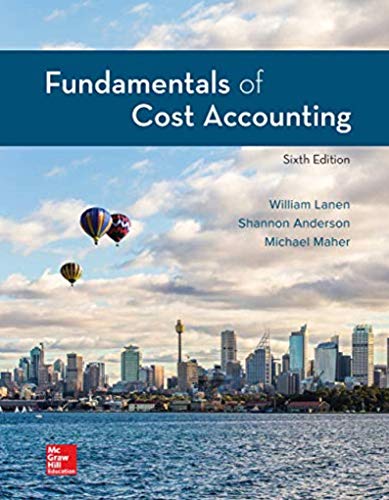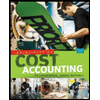
How are activity-based costing and activity-based management similar? How do they differ?
Explain the manner in which activity-based costing and activity-based management are similar and different.
Explanation of Solution
Activity-based costing (ABC):
Activity-based costing refers to the method of costing where the overhead cost is assigned to various products. This costing method identifies the relationship between the manufacturing overhead costs and the activities. This relationship is then used to allocate indirect costs to the products.
Activity-based management (ABM):
Activity-based management is the process of identification of the strength and weakness of the activity and determining where there is a need for improving the cost efficiency of the activities.
The similarities between activity-based costing and activity-based management are briefly explained below:
Activity-based costing and activity-based management are both used for determining the activity based processes of production. Activity-based costing focuses on identifying the cost and activity relationship of the process whereas activity-based management identifies the strength and weaknesses of the activities.
The difference between activity-based costing and activity-based management are as follows:
Activity-based costing focuses on using the costing information of activity-based costing to make a better decision, but activity-based management is more focused on identifying the ways to make the activities more efficient in the organization.
Want to see more full solutions like this?
Chapter 10 Solutions
Fundamentals Of Cost Accounting (6th Edition)
- I am looking for help with this general accounting question using proper accounting standards.arrow_forwardPlease provide the correct answer to this general accounting problem using accurate calculations.arrow_forwardPlease explain the solution to this financial accounting problem with accurate explanations.arrow_forward
- Please explain the correct approach for solving this general accounting question.arrow_forwardI am searching for the correct answer to this financial accounting problem with proper accounting rules.arrow_forwardI am looking for help with this general accounting question using proper accounting standards.arrow_forward
- Please provide the solution to this financial accounting question using proper accounting principles.arrow_forwardCan you provide the valid approach to solving this financial accounting question with suitable standards?arrow_forwardPlease provide the accurate answer to this financial accounting problem using appropriate methods.arrow_forward
 Cornerstones of Cost Management (Cornerstones Ser...AccountingISBN:9781305970663Author:Don R. Hansen, Maryanne M. MowenPublisher:Cengage LearningPrinciples of Accounting Volume 2AccountingISBN:9781947172609Author:OpenStaxPublisher:OpenStax College
Cornerstones of Cost Management (Cornerstones Ser...AccountingISBN:9781305970663Author:Don R. Hansen, Maryanne M. MowenPublisher:Cengage LearningPrinciples of Accounting Volume 2AccountingISBN:9781947172609Author:OpenStaxPublisher:OpenStax College Principles of Cost AccountingAccountingISBN:9781305087408Author:Edward J. Vanderbeck, Maria R. MitchellPublisher:Cengage Learning
Principles of Cost AccountingAccountingISBN:9781305087408Author:Edward J. Vanderbeck, Maria R. MitchellPublisher:Cengage Learning Managerial AccountingAccountingISBN:9781337912020Author:Carl Warren, Ph.d. Cma William B. TaylerPublisher:South-Western College Pub
Managerial AccountingAccountingISBN:9781337912020Author:Carl Warren, Ph.d. Cma William B. TaylerPublisher:South-Western College Pub Financial And Managerial AccountingAccountingISBN:9781337902663Author:WARREN, Carl S.Publisher:Cengage Learning,
Financial And Managerial AccountingAccountingISBN:9781337902663Author:WARREN, Carl S.Publisher:Cengage Learning, Managerial Accounting: The Cornerstone of Busines...AccountingISBN:9781337115773Author:Maryanne M. Mowen, Don R. Hansen, Dan L. HeitgerPublisher:Cengage Learning
Managerial Accounting: The Cornerstone of Busines...AccountingISBN:9781337115773Author:Maryanne M. Mowen, Don R. Hansen, Dan L. HeitgerPublisher:Cengage Learning





